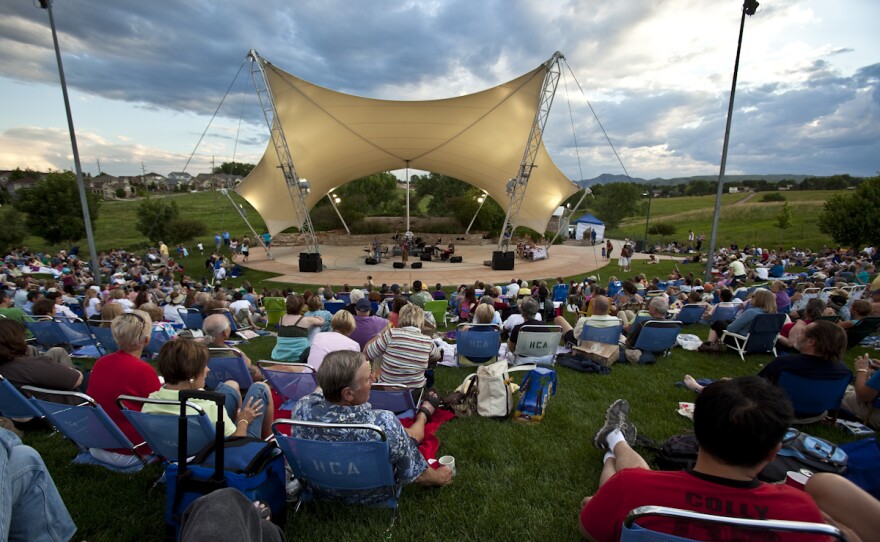Traffic jams. Construction cranes. The rising cost of living. All unpleasant, but familiar parts of life in Colorado.
These growing pains are weighing on communities all along the Front Range, including the Denver suburb of Lakewood, where residents are deciding whether to put a new cap on growth.
On a recent evening, hundreds flocked to a public concert celebrating the city's 50th birthday. Sharon Graves snacked on a bag of Doritos before setting up her lawn chair.
"I've been here in Colorado about 43 years," she said.
Graves and her husband moved to Lakewood from the east coast for work. Back then, it was a quiet and affordable place. But these days, not so much. In the past 10 years, the population has jumped from about 140,000 to nearly 160,000.
"Much more traffic. Many more people. A lot more growth in the city," Graves said. "I would love to see people feeling less frustrated, less stressed by the overcrowding. Yet, I'm a senior myself and I don't want my property taxes to go up."
That frustration has led residents like Graves and others to ask whether it's time to slow down the pace of development. In a special election on July 2, voters will decide if they want to cap housing growth to 1% of the existing stock per year. Growth is hovering around 2% right now.
If passed, Question 200 would also give city council more authority to deny big residential projects.

Another longtime resident, Cathy Kentner, has spent more than three years getting Question 200 on the local ballot. She called it a more responsible way to control development.
"The type of growth we've seen has caused our housing prices to skyrocket and rents to climb to the point where I don't even know if my own children will be able to live here," Kentner said.
Kentner said after Lakewood lifted density limits on new residential development in 2013, growth — particularly of high-rise apartment buildings — got way out of control.
"The initiative is a direct result from that," she said. "Trying to correct that and get our city back on the right track."
A city spokeswoman said Kentner's use of the term "density limits" to describe the zoning code changes in 2013 was misleading.
What occurred in 2013, the spokeswoman said, is that "changes in Lakewood's zoning code allowed residential uses on properties along commercial corridors where residential uses had previously been prohibited."

But the city's new high-rise apartment buildings are exactly what brought software engineer Matthew Peyton to Lakewood in 2016. He uses light rail for his daily commute to Denver, and says it's a lot cheaper to live here.
"It is, about 25%," Peyton said. "That much."
He thinks a growth cap would limit other young professionals like himself from living here, which is why he's casting a 'no' vote. Lakewood Mayor Adam Paul is also against it, calling Question 200 shortsighted.
"We're adding three jobs at every one residential unit according to the city's housing study," Paul said. "So we've got to find that balance. And I don't think 200 strikes that balance."
Paul said the city council is already taking steps to better understand residents' concerns around growth. One example: a special committee of council members and residents that meets regularly called the "Development Dialogue."

"They've made already over 30 recommendations based on what we've heard," Paul said. "So some of the multifamily (housing) you've seen go up, you won't see that go up anymore because rules to our zoning code have been changed based on neighborhood feedback."
So, is controlling growth at the ballot box the right way to go? While smaller in scale, the last community that passed a similar growth cap was Golden in 1995.
Andrew Goetz studies growth issues, and is a professor at the University of Denver. He points to a similar measure that Boulder voters passed in the 1970s.
"(Boulder) has been able to achieve a lot of goals as far as their growth control program is concerned, especially with regards to open space and not allowing the city to sprawl out and controlling the type of development that is going on," Goetz said.

At the same time, Goetz added, "it's increased the price for housing in Boulder and has forced people who might otherwise want to live in Boulder to have to live in other communities farther away."
That's the same concern shared by Peyton, the Denver commuter who recently moved to Lakewood.
"This kind of law, when it was passed in Boulder, made it unaffordable for everyone that came there for all the reasons to live there," Peyton said. "To participate in the community, to work there. And I don't want to see the same thing happen here."
Neither do the some of the well-known opposition groups, like the National Association of Realtors, which has spent hundreds of thousands of dollars to defeat Question 200 leading up to next week's election.
Editor's note: This post has been updated to reflect a statement from the city regarding the term "density limits."









